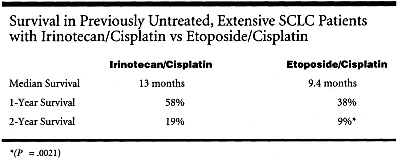Irinotecan/Cisplatin Produces Better Survival Than Etoposide/Cisplatin in Extensive SCLC
OSAKA, Japan-Irinotecan/cisplatin combination therapy improved survival compared to etoposide/cisplatin in extensive-stage small-cell lung cancer (SCLC), Masahiro Fukuoka, MD, reported at an investigators’ workshop sponsored by the University of Texas M. D. Anderson Cancer Center and Pharmacia Oncology. Two-year survival in the Japan Clinical Oncology Group (JCOG)-9511 study was 19% with irinotecan/cisplatin vs 9% with etoposide/cisplatin, according to Dr. Fukuoka, who is professor of the 4th Department of Internal Medicine at Kinki University School of Medicine in Osaka, Japan.
OSAKA, JapanIrinotecan/cisplatin combination therapy improved survival compared to etoposide/cisplatin in extensive-stage small-cell lung cancer (SCLC), Masahiro Fukuoka, MD, reported at an investigators workshop sponsored by the University of Texas M. D. Anderson Cancer Center and Pharmacia Oncology. Two-year survival in the Japan Clinical Oncology Group (JCOG)-9511 study was 19% with irinotecan/cisplatin vs 9% with etoposide/cisplatin, according to Dr. Fukuoka, who is professor of the 4th Department of Internal Medicine at Kinki University School of Medicine in Osaka, Japan.
To lay the groundwork for JCOG-9511, Dr. Fukuoka first reviewed data from a phase II study of irinotecan (Camptosar) and etoposide (VePesid) in 50 patients with extensive-stage SCLC. The combination of irinotecan and etoposide yielded an overall response rate of 66%, with a complete response rate of 10% in patients with previously untreated extensive-disease SCLC, Dr. Fukuoka said. Median survival time was 11.5 months. One-year survival was 43.2%, and 2-year survival was 21.3%. Toxicity was mild, with 28.0% grade 3 or 4 leukopenia and 62.9% grade 3 or 4 neutropenia. Only one patient experienced grade 3 diarrhea, and there was no treatment-related mortality. Other major toxicities were leukopenia in 28% and anemia in 14%. This topoisomerase-targeting chemotherapy is a new, active regimen for extensive-disease SCLC, Dr. Fukuoka stated.
Phase III Study Results

These promising data led to the phase III JCOG-9511 study, which compared irinotecan/cisplatin (Platinol) to etoposide/cisplatin in 154 patients with extensive, previously untreated SCLC. Dr. Fukuoka reported that at the first planned interim analysis, the overall response rate was significantly better with irinotecan/cisplatin (83.1%) than with etoposide/cisplatin (67.5%), and accrual stopped because of better survival. As of the March 2000, follow-up analysis, the survival advantage with irinotecan/cisplatin had been sustained (see Table), and 2-year survival was 19% with irinotecan/cisplatin vs 9% with etoposide/cisplatin (P = .0021). This had led to irinotecan/cisplatin becoming the new standard of care in Japan for extensive disease SCLC.
Neutropenia was a major problem on both regimens and thrombocytopenia was relatively rare in either. Otherwise, the two regimens have somewhat different toxicity profiles. Leukopenia was more common with irinotecan/cisplatin. Dr. Fukuoka said that diarrhea was the most problematic nonhematologic side effect with that regimen. There were four treatment-related deathsthree in the irinotecan/cisplatin arm, and one in the etoposide/cisplatin arm.
This regimen is very active in SCLC. Major toxicities are neutropenia and diarrhea, but irinotecan/cisplatin produces better survival than etoposide/cisplatin in extensive SCLC, Dr. Fukuoka concluded.